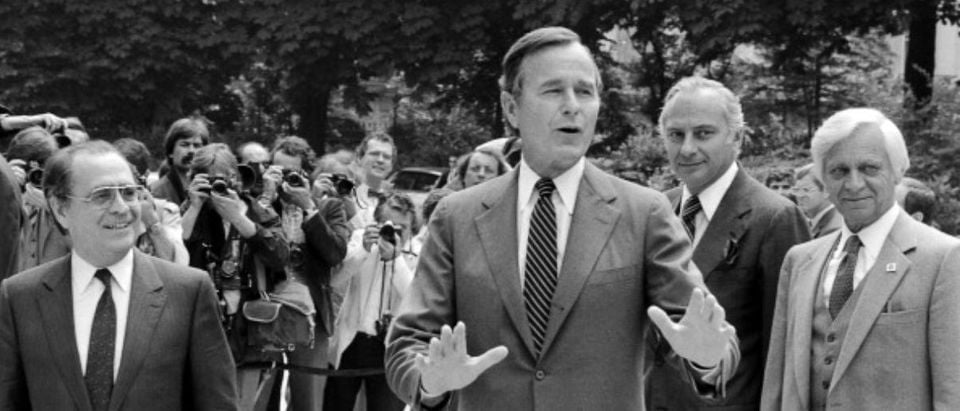When Vice President Bush decided to seek the presidency, he faced a difficult task: how to differentiate himself from a highly popular Ronald Reagan without also alienating Reagan’s conservative base. Reagan was considered closer to conservative icon Sen. Barry Goldwater, while many considered George Bush closer to Republicans like former New York governor and Vice President Nelson Rockefeller and Rockefeller’s associated allies of trilateralists, internationalists, and globalists, who were anathema to some conservatives.
Bush carefully and cleverly straddled this divide in his 1988 New Orleans acceptance speech. He reassured Reagan’s base with his “Read my lips, no new taxes!” pledge, while nodding to the center by promising a “kinder, gentler” governing style. He could not alter his experience, however: he was a genuine internationalist, and that fact served our country well during his presidency.
No other American has reached the Oval Office as well-prepared for the challenges of the presidency as George H.W. Bush: war hero, husband and father, businessman, Congressman, head of the GOP, liaison to China, director of the Central Intelligence Agency, and Vice President. Bush’s life was dedicated to serving others, and more often than not, that service involved some extraordinarily heavy lifting. After all, he ran the GOP during the height of Watergate!
Many of the accolades since his death have focused on Bush’s international successes in foreign policy and waging limited warfare. And while domestic policy was not a natural for him, he deserves enormous credit for championing and signing into law the 1990 Americans With Disabilities Act, the 1990 Clean Air Act amendments, and the 1991 Civil Rights Act. He campaigned in 1988 to be the nation’s “education president” (Reagan had wanted to abolish the Education Department), and in September 1989 he met with 49 of the nation’s governors at an historic summit in Charlottesville, Virginia. That summit ultimately established six national education goals that were intended to ensure excellence, accountability, and rigor in our public schools. Bush’s successor notably continued that effort and even expanded the number of goals.
The domestic economy, however, gave Bush major headwinds. When he broke his “no new taxes” pledge, he alienated the Reagan base — a move that contributed mightily to his 1992 re-election loss. A relatively mild recession in late 1991 that lasted into the next year did not reassure voters as Bush sought a second term, even though that recession ended well before election day.
Given his background, experience, and temperament, foreign policy was Bush’s forte: delicate handling of the Cold War’s finale, not gloating over the Soviet Union’s collapse, quietly nurturing Gorbachev, supporting German reunification, strengthening NATO, and, of course, moving half a million men and women halfway around the globe to halt and reverse Iraq’s aggression against Kuwait.
At the end of the 1991 Persian Gulf War, with the masterful assembling of some 35 coalition nations, Bush enjoyed domestic approval ratings above 90 percent — and yet a little more than 20 months later, he lost re-election with only 38 percent of the vote to a relative novice on the national stage, Arkansas Gov. Bill Clinton.
But there were no recriminations, no second-guessing. Bush’s life was not defined by the high offices he held; his life was defined by who he was, what he valued, and the people he loved most — his family and the American people. Bush moved on with his life, only to establish a few years later a close personal friendship with the man who cost him a second term. And like Ronald Reagan, he could laugh at himself: cue to Dana Carvey and Saturday Night Live.
George H.W. Bush always did what he thought was right, what he thought was best for his country. He was all about service, not self. There have been plenty of adjectives used to describe him recently: gracious, loving, thoughtful, firm, kind, humble, decent, a gentleman. Let me offer another: Churchillian.
Winston Churchill was perhaps the best-prepared prime minister in British history. But after saving the United Kingdom from near destruction at the hands of Adolf Hitler, Churchill was abruptly thrown out of office in 1945. With his many successes, George Bush, like Churchill, was returned to private life long before he was ready. As we hear often in Washington, “No good deed goes unpunished.”
The New York Times this past weekend referred to American politics today as “the politics of anger, grievance and polarization.” Those weren’t the politics of George H.W. Bush; and they aren’t, fundamentally, the politics of the American people either. Bush’s politics were about joy, cheerful service, and collaboration across the aisle. If you’re betting on how to describe America’s future, bet on Bush’s words: they represent our nation’s best. George H.W. Bush will always be with us to remind Americans of who we really are.
Winston Churchill’s life is commemorated in a modest stone carving embedded in the floor near one of the entryways to London’s Westminster Abbey. The words are as arresting in their simplicity as they are moving: “Remember Winston Churchill.” We would do well — as individuals and as a nation — to “Remember George Bush.”
Charles Kolb served as deputy assistant for domestic policy to President George H.W. Bush from 1990-1992.
The views and opinions expressed in this commentary are those of the author and do not reflect the official position of The Daily Caller.


